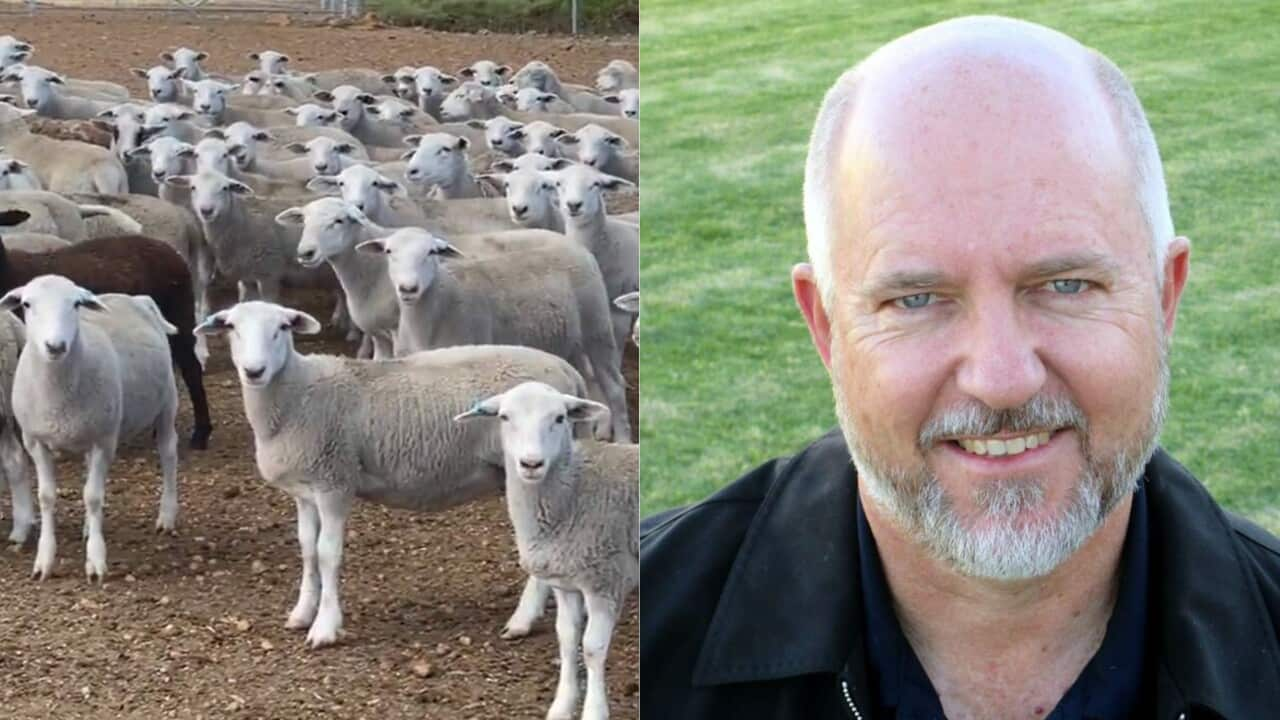Farming is a labour of love, but for many in Western Australia, it is now a source of heartbreak and desperation.
The combination of the annual dry season, running out of feed, and an export ban has left many struggling to continue operations and facing the prospect of killing off their animals.
This week, sheep farmer Wayne Smith shared a post on social media illustrating his situation.
“It’s been a very teary day for me,” he wrote alongside a video.
“Started organising a neighbour to dig a pit big enough to put 3,000+ sheep in. This video shows our beautiful lambs.
“I can’t cope with the thought of shooting them. No buyers.”
‘There’s nowhere to put them’
In an interview with SBS News, Smith explained that his situation isn’t mainly caused by dry weather or drought, but rather by government bans on livestock exports and the increasing challenge for small farmers like him to find abattoirs willing to take his sheep.
“A lot of people just don’t understand, ‘why can’t you just sell ’em for a dollar? Why can’t you just give them away?’ Because there’s nowhere to put them,” he said.
“You can’t put them into an abattoir, you can’t put them onto a ship, because it’s full and they’re giving everyone else priority.”
After “months and months” of trying and failing to sell his flock of several thousand sheep, Smith reached a point where he had only a week’s feed left – and realised he was “going to have to do what I don’t want to do”.
Last week, Wayne Smith started digging a pit big enough to put 3,000 sheep in. Source: Supplied / Wayne Smith
“I can’t take them anywhere and I can’t let them starve,” he said. It was at this point that he posted his message on X.
It has since been reposted more than 1,200 times, and attracted close to 1,000 comments. Many of those came from people offering to help.
“Fortunately for me, God bless them, some people have come and just said, ‘Look, I’ll take everything,'” Smith told SBS News.
“I’m actually loading a truck right now … So it looks like we’ll have about three-and-a-half thousand sheep on the truck by Wednesday next week.”
‘Too late’
While he narrowly avoided having to bury his flock, Smith said that he hasn’t been able to overcome the bigger difficulties facing him and his farm.
“For me, it’s too late,” he said. “We’ve put the farm on the market because you can’t make money if you don’t sell, and we just haven’t been able to.”
Smith’s situation is not an isolated incident.
Michael Campbell farms cattle in Yornup, and sheep and grain in Arthur River.
He said farmers in many areas of Western Australia are facing cripplingly dry conditions.
“Should it be a late break in the season as forecast, it would be disastrous for many of the farmers,” he said.
“There are pockets that are okay … but it’s affecting a huge part of the state.”
John Hassell, president of the WA Farmers Federation, said the situation was due to a combination of factors that had taken place during the dry season, which has been longer than usual.
“In September last year the rain stopped, and we haven’t had any rain since, and there was no opportunity for farmers to stockpile fodder for the upcoming autumn,” he said.
He said many farmers have been left with a surplus of sheep and nowhere to take them, with local abattoirs “chock-a-block full”, and selling sheep overseas no longer an option.
The federal government is phasing out live sheep exports, and while the ban has not yet come into effect, Hassell said shipping companies have already ceased operations in Australia.
“The shipping companies decided ‘there’s no future in coming to Australia, we’ve got to develop our markets elsewhere’ and they’re doing that,” he said.
“We’ve been left high and dry because the ships have decided to go elsewhere, even though it hasn’t been enacted yet.”
Farmers have also criticised the , which Hassell said would have enabled farmers to export meat to the Middle East.
“We’ve had this configuration of events that have just conspired against us and caused this pretty disastrous situation in WA,” he said.
“Now people have got no water and they’ve got no feed and they’ve got no market.”
The state government has established a to help investigate and address farmers’ concerns and seasonal challenges.
On Thursday, hundreds of farmers gathered to discuss issues and proposals to put forward to the taskforce.
Campbell said on top of the seasonal challenges and export issues, many farmers were already struggling and in need of support.
“The operating costs you’ve got on farms are not going down, they’re going up, and everyone has come off a low-income year,” he said.
“This financial year, the growing yields weren’t as good as everyone was hoping; the sheep prices have (dropped) considerably and so have the cattle prices, so everyone’s coming off a year where they really haven’t made any money.
“I just hope the taskforce has a quick and immediate response because that is needed.”

